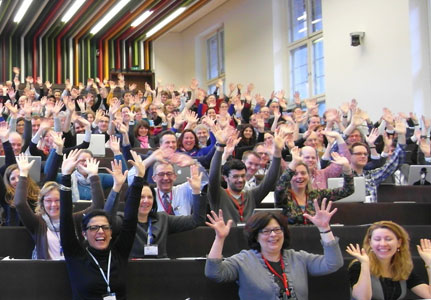Pioneering IRDiRC ~omics projects, which include EURORDIS as a partner, are making great strides forward!
March 2014 In February 2014 nearly 300 attendees convened in Heidelberg for the 2nd Joint Annual Meeting of three linked flagship “~omics” research projects, RD-Connect, NeurOmics and EURenOmics, funded by the European Commission under the International Rare Disease Research Consortium (IRDiRC). Amongst research and industry participants were patient representatives invited by EURORDIS as members of the Joint Patient Advisory Council (RD-PAC). EURORDIS is one of 27 full partners in RD-Connect, a project launched as an integrated platform connecting databases, registries, biobanks, and clinical bioinformatics for rare disease research.
In February 2014 nearly 300 attendees convened in Heidelberg for the 2nd Joint Annual Meeting of three linked flagship “~omics” research projects, RD-Connect, NeurOmics and EURenOmics, funded by the European Commission under the International Rare Disease Research Consortium (IRDiRC). Amongst research and industry participants were patient representatives invited by EURORDIS as members of the Joint Patient Advisory Council (RD-PAC). EURORDIS is one of 27 full partners in RD-Connect, a project launched as an integrated platform connecting databases, registries, biobanks, and clinical bioinformatics for rare disease research.
The three ~omics projects are collaboratively addressing and will continue to address several challenges in rare disease research:
- establishing and providing access to harmonised data and samples
- performing the molecular and clinical characterisation of rare diseases
- boosting translational, preclinical and clinical research
- streamlining ethical and regulatory procedures
By conducting whole exome sequencing on patient samples, NeurOmics and EURenOmics have identified a number of new genes related to diseases and their variants covered by the projects.
For RD-Connect, the primary focus has been to ensure that the project is aligned with the needs of researchers submitting data to the platform capable of integrating and further analysing data from ~omics studies using bioinformatics tools. Work is also progressing on integration of biomaterials and phenotypic data with the development of a searchable online catalogue for biosamples and agreement on the use of standard terminology for describing a patient’s phenotype (visible, expressed traits) using the Human Phenotype Ontology.
As the IRDiRC mandates, all data generated is released for the benefit of the wider research community. NeurOmics and EURenOmics have committed to archiving their data in the European Genome-phenome Archive (EGA) at the European Bioinformatics Institute (EBI) and sharing it within the RD-Connect system. The first datasets have just been uploaded and policies as to how data can be shared with the research community have been established across projects to protect patient data and allow investigators the time to analyse their own results before data are ultimately shared to the benefit all researchers.
Informed consent (taking into consideration ethical, legal and social issues) materials have been drafted to best inform genetic analysis participants of the fate of their samples and the potential sharing of data.
Concrete steps have been taken towards the two main IRDiRC objectives of delivering 200 new therapies and the means to diagnose most rare diseases by the year 2020 – and the roles and expectations of patients and their families have not been overlooked.
For more information on the specific scientific results of RD-Connect and the other ~omics projects please read their publishable summaries or contact Anna Kole at anna.kole@eurordis.org.
Louise Taylor, Communications and Development Writer, EURORDIS
